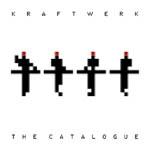
Kraftwerk The Catalogue: Four Decades of Masterworks
(Kling Klang/EMI/Mute/Astralwerks)
It was only a matter of time…
Honestly: guitars, guitars, guitars… where was music going to go once the Hippies went the gateway route, found coke and hit the discos? The Stooges and the MC5 were blazing loud and minimal trails away from Woodstock and into the depths of Detriot depravity: Kick out the jams, motherfucker! The forgotten boys had to search and destroy because peace died in Altamont and The Who was writing rock operas.
So, with a motorized whir and a synthesized honk, Autobahn arrived and put Germany ahead of everyone else clamoring for the Jetson-ized ideal, technology now infiltrating the beloved pop paradigm with predictions of cultural dependency delivered upon us with text book recitation and appropriately robotic candor. Kraftwerk ushered in our Computer World and music hasn’t been the same since, an ambiguous fact that’s proven both pro and no.
The Catalogue, Kraftwerk’s seminal eight-album body of work, (Autobahn, Radio-Activity, Trans Europe Express, The Man Machine, Computer World, Techno Pop, The Mix and Tour De France), will see the light of day as a set of newly re-mastered gems, five years after the promise of their release had initially been made. Individual re-masters were released on October 6th, but only five of them are available in the U.S.: Autobahn, Radio-Activity, Trans Europe Express, The Man Machine and Tour De France.
Why did it take five years to happen?
To be absolutely Kraftwerk-ian about it, one would assume that technology had something to do with it. As they themselves worked to advance what is now a dominant and inescapable aspect of our oversexed cyber-humanity, Kraftwerk can be seen more as a progressive social entity, a science experiment that bled itself onto vinyl. Modern life, modern amenities and modern living: sterilized from any turbulence of the 70s, foreshadowing human disconnection and technology’s gift of flight from reality. Theirs was a world whose main goals were pleasant drives and trans-European travel, soma-level resignation that inadvertently justified machine-borne paranoia.
I look at 1991’s The Mix, their re-imagined or updated selection of songs that had, up to that point, been their best known. As both a response to the availability of new technology, and as an alternative to putting out some staid “best of” compilation, The Mix was Kraftwerk appealing to a new era when guitars were back in vogue and hip-hop had reached its golden age. The Mix comes off as attempt to harness the present, confessing that, even in as primitive a digital era as 1991, technology will remain in flux, never to be outrun by art or music. Progress is forever elusive and temporary while the tangibility of media remains permanent and destined to be left behind.
That being the case, it’s possible that Kraftwerk had to catch-up a little bit before taking on the task of rewerking their “four decades of masterworks.” And while Kraftwerk represents an apex in technology’s past, their mode of communication has defied the fabled slow n’ steady, its message now “just don’t nap, and you can beat anything, or anyone.”
Similarly, hip-hop evolves at the same rate, its very being owed to what was also an apex in technology’s past.
In 1982, Hip-hop pioneer Afrika Bambaataa took a loop from Kraftwerk’s Trans-Europe Express and created his classic hip-hop jam, Planet Rock.
As samplers and mixers became essential to the development of the urban musicscape, Kraftwerk’s involuntary entanglement with the scene basically cemented music’s reliance on technology and played a role in shaping modern dance music (trance, techno, house) and then later mutations like IDM, dance punk, digital hardcore and industrial music. If Kraftwerk had introduced the computer age to music, Bambaataa made sure it stuck around.
Should we be thankful?
We can listen to something like The Catalogue and all agree that its eight techno-flavored goodies have left as influential and as indelible an imprint on music as The Beatles. For now dismissing all the crap powering the late night, pacifier-juiced dance crews and the synth’d up push-button production that backs-up a lot of today's more disposable pop stars, Kraftwerk’s dynamic electricity brought modernism to music and opened up new possibilities for artists to explore.
Having drawn that obvious conclusion, Kraftwerk also helped bring about our “enlightened” age that downloads albums and uses computer applications to aid in music creation and production. Could Kraftwerk have foreseen a time when music would become a “file;” something so impersonal and cold; something that could be generated, sold and manufactured with so little as a drop-down menu and a mouse click?
While punk rock spit vitriolic rage at the self-indulgence of guitar bands and the plastic dance fever of the disco era, deciding to level the field enough so ANYONE could be in a band, whether you could play or not, we find ourselves in another time of this sort. In this instance, though, it’s only the accessibility of technology that’s allowing anyone to make music without the trouble of learning an instrument. The convenience is all the motivation needed, rebellion not even a consideration.
But, it’s also the accessibility of technology that’s allowed Kraftwerk’s analog history to shift into digitized clarity. For now, Kraftwerk can sound better. Antiquated, but better. As a music group so identified with the computer age, Kraftwerk’s Catalogue belongs in a hard drive and not on a shelf where its permanence gathers dust in our current virtual world.
